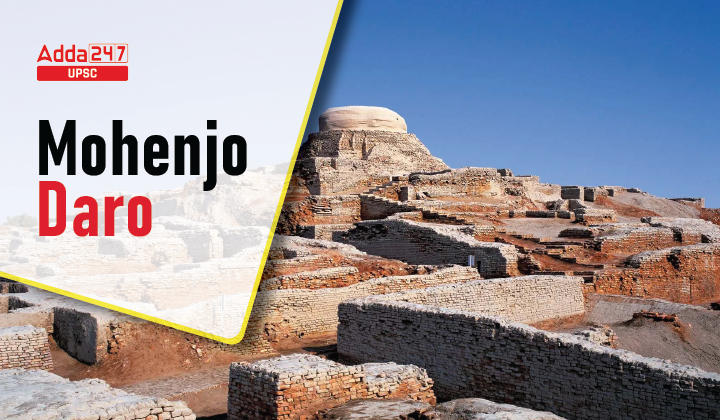Table of Contents
Mohenjo Daro- Relevance for UPSC Exam
General Studies I- Ancient History
In News
Heavy floods in Pakistan have pushed the archeological site of Mohenjo Daro – near the bank of the Indus River – to the “brink of extinction”.
Mohenjo Daro might be removed from the world heritage list, if urgent attention towards its conservation and restoration is not given.
Mohenjo Daro
- Mohenjo Daro is a 5000-year-old archaeological site located about 80-km off the city of Sukkur.
- It comprises the remnants of one of two main centers of the ancient Indus Valley Civilization, the other one being Harappa, located 640 km to the northwest, in Punjab province.
- Mohenjo Daro, which means ‘mound of the dead’, was one of the oldest cities of the world and is better known for planned city of the ancient civilization.
- The sheer size of the city, and its provision of public buildings and facilities, suggests a high level of social organization.
- Though in ruins, the walls and brick pavements in the streets are still in a preserved condition.
Discovery
- The ruins of the city remained undocumented for around 3,700 years, until 1920, when archaeologist RD Banerji visited the site.
- Its excavation started in 1921 and continued in phases till 1964-65.
- The site went to Pakistan during Partition.
Other Indus Valley sites
- The Indus Valley Civilisation spanned much of what is now Pakistan and the northern states of India (Gujarat, Haryana and Rajasthan), even extending towards the Iranian border.
- Its major urban centres included Harappa and Mohenjo Daro in Pakistan, and Lothal, Kalibangan, Dholavira and Rakhigarhi in India.
- Mohenjo Daro is considered the most advanced city of its time, with sophisticated civil engineering and urban planning.
- When the Indus Valley Civilisation went into sudden decline around 19th century BC, Mohenjo Daro was abandoned.
Present Situation
- According to media reports, many streets and sewerage drains of the historical ruins have been badly damaged due to the floods.
- However, the work of removing the sediments deposited due the flooding is still underway.
- But if this kind of flooding happens again, the heritage site may once again get buried under the ground, archaeologists say.
- It is expected that UN Secretary General Antonio Guterres will visit the site during his visit to Pakistan on September 11.
- The visit might provide some clarity on if the site has lost some of its attributes that are necessary for it to retain its prestigious world heritage tag.
Losing World Heritage Tag
- There are around 1,100 UNESCO listed sites across its 167 member countries.
- Last year, the World Heritage Committee decided to delete the property ‘Liverpool – Maritime Mercantile City’ (UK) from the World Heritage List.
- This was due to the irreversible loss of attributes conveying the outstanding universal value of the property.
- Liverpool was added to the World Heritage List in 2004 in recognition of its role as one of the world’s major trading centres in the 18th and 19th centuries – and its pioneering dock technology, transport systems and port management.
- Before that, the first venue to be delisted by the UNESCO panel was the Arabian Oryx Sanctuary in Oman, in 2007, after concerns over poaching and habitat degradation.
- Another site to be removed from the World Heritage list in 2009 was Elbe Valley in Dresden, Germany, after the construction of the Waldschloesschen road bridge across the Elbe River.




 TSPSC Group 1 Question Paper 2024, Downl...
TSPSC Group 1 Question Paper 2024, Downl...
 TSPSC Group 1 Answer key 2024 Out, Downl...
TSPSC Group 1 Answer key 2024 Out, Downl...
 UPSC Prelims 2024 Question Paper, Downlo...
UPSC Prelims 2024 Question Paper, Downlo...




